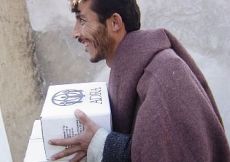After nearly a decade of political and civil unrest in the Democratic Republic of Congo (DRC), the Adventist Development and Relief Agency (ADRA) is helping displaced families rebuild their lives, one home at a time.
ADRA officials in the DRC report that much of the need is concentrated in South Kivu province in Eastern Congo, the area of origin of the greatest number of refugees and internally displaced people from the Second Congo War. “A lot of displacement took place in this territory,” said Andrew Njoke, country director for the ADRA office in the DRC. “Presently, families are returning into the region with little or no assistance . . . housing and farm lands are in ruins as many homes were destroyed and uninhabited. . . . Returning families are living in plastic sheeting, or in hastily erected grass huts or crowded in host families.”
In September of 2005, ADRA initiated a project to assist an estimated 900 families in the ongoing resettlement projects in Makobola village in South Kivu province. Currently, ADRA is expanding the ongoing intervention to support an additional 60 families, bringing the number of beneficiaries to nearly 6,000 people.
The assistance provided for the additional 60 families mirrors the aid the original 900 families have already received, ensuring that “all 960 families will have received the same level of assistance by the end of the project,” assured Njoke.
Each family will receive a kitchen kit containing eating utensils, plates, cups, and cooking pots; two 20-liter jerry cans for water; a hygiene kit comprised of bath soap, laundry soap, and a treated mosquito net, as well as blankets and shoes for the children. As it did with the initial 900 families, ADRA is providing the additional 60 families with shelter kits containing construction materials, such as galvanized roofing sheets, roofing and carpentry nails, doors, and windows. ADRA will help construct the two-bedroom homes with unbaked mud bricks supplied by the beneficiaries.
Families are selected from members of the community who have been displaced, or have suffered considerable loss as a result of the recent war. According to Njoke, many fled Makobola during a bloody massacre that took place in late 1998. Priority will be given to households headed by women, children, and the elderly.
The project is slated to end January 31. The ADRA Denmark office provides funding to assist the original 900 families, and ADRA Canada and the ADRA International office are providing funding for the additional 60 families. The expanded 60-family project is worth an estimated $70,000.
In addition, ADRA has constructed a school and rehabilitated a health center in the village.
ADRA is present in 125 countries, providing community development and emergency management without regard to political or religious association, age, gender, or ethnicity.


